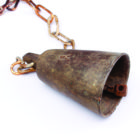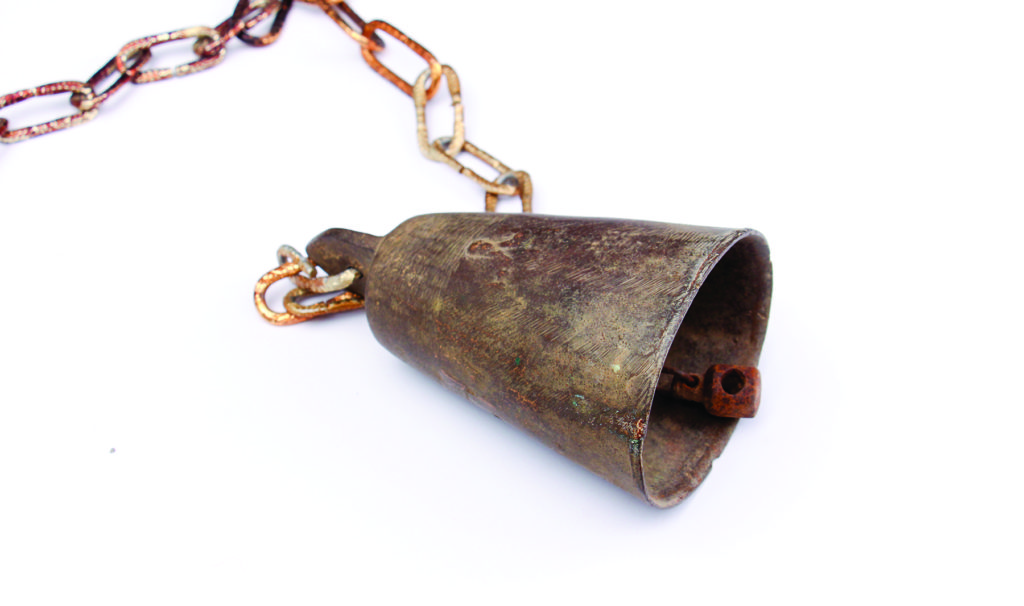
Jan 29, 2019
By Rev. Carl Greene
The evening air has a frosty edge to it. The parking lot is packed with cars and trucks coated with Potter County dirt. Just past the ticket counter, the stands are nearly full. The concession booth is billowing out the sweet aroma of fried and sugary goodness. A host of people are expectantly carrying their cow bells with them. (You read that correctly—people are carrying bells that attach to a strap that goes around a cow’s neck.) It is high school football at its finest in North Central Pennsylvania.
Cow Bells
Cow bells are an intriguing part of this story—they offer the opportunity for fan participation in the game. In fact, cow bells can play an overwhelming part of the game depending on your tolerance for deafening noise coming from the hands of fellow bell-wielding fans. As the opposing team begins to experience success and gains yardage towards the possibility of scoring points, the hometown fans begin to raise their bells. As the opposing team assembles at the line of scrimmage and the quarterback prepares to begin the play, the hometown crowd breaks out the bells. The deafening noise of clanging bells is aimed at a key objective: to distract the other team. The goal of the cow bell is to break the visiting team’s momentum by creating an atmosphere where teammates can no longer work together as a team. The clang of the cow bell breaks team cohesion. This cow bell phenomenon can be seen clearly in Paul’s letter to the Corinthians.
Cow Bells and Corinth
If I speak in the tongues of men and of angels but have not love,
I am a noisy gong or a clanging cymbal.
—1 Corinthians 13:1 (ESV)1
Paul is warning the Corinthian Church that there are cow bells—gongs and cymbals— breaking their momentum. They are unable to work together as a team, unable to fully utilize the spiritual gifts described in 1 Corinthians Chapter 12, because of the atmosphere they have created. Corinth is a context without love—a context full of distracting noise. Paul goes on to provide a list of seven items that express the clanging cow bells that are noisily harming the “team” in Corinth:
Love does not envy or boast; it is not arrogant or rude.
It does not insist on its own way; it is not irritable or resentful…
—1 Corinthians 13:4b-5 (ESV)
My personal sins impact the church. The first three items, envy, boasting, and arrogance, are behaviors that we can cover up so other people do not see them—at least, we think other people do not see them. We might have twinges of envy or some boastful/prideful comments that play through our minds, but we bury them rather than express them—at least at church. In fact, we can bury them so deep that we are no longer honest with ourselves that we even have these tendencies; after all, who wants to admit envy or arrogance? No matter how much we think we can bury or hide our thoughts, though, there is a cost to the church. Based on Paul’s letter to the Corinthians, when I do not repent of my envy or arrogance, I am clanging the cow bell that interferes with the spiritual gifts of the church. The reason I do not think I am disrupting the body is because I have grown deaf from clanging my cow bell so long without repentance.
My self-centered sins impact the church. It is bad to be rude. My mother taught me that one. The KJV rendering of rude has a nice ring to it: “doth not behave itself unseemingly.” The cow bell of rude points beyond belching at my mom’s table and bad manners—it points to “unseemingly” actions that pay no respect to other people in the church. It is where my decision-making is based solely on what I want, rather than considering how it impacts the other people in community with me. This points to the next behavior in the list: “insist on its own way,” also known as self-seeking. I do not simply decide if I am going to do something based on whether or not it is permissible. I also need to take into account whether or not it brings good to my neighbor.
This means that if I want something a certain way in the church, and it is a perfectly
legitimate way to want it—I am called to give up that justified want if it does not seek the good of others. This brings a whole new measuring stick to deciding how to play nice at church. When decisions are made at church, what I want needs to be checked at the door in favor of what is a blessing to others. Insisting on my wants is not a right—it is a clanging cow bell that distracts the team and moves the church away from experiencing spiritual gifts as a body.
The sins of others do not entitle me to a cow bell. None of us are irritable and resentful without cause. We have lots of reasons to be irritable: someone said something nasty; I was not recognized for something that I did; someone spilled split pea soup on my white shirt at fellowship meal; and the list goes on. Paul does not make the case that life is always happy times. He does make it clear that bad days are not an excuse to unleash Captain Angry Pants. In fact, when I am easily angered, when I allow things to build up to a boiling point, my sin has a multiplier effect. My irritation is not only between myself and another individual(s)—it is a clanging cow bell in the church.
Irritability and resentfulness are especially dangerous within family relationships. It is easy to be irritable with our family—after all, they’re stuck being related to us. Our spouse, our children, our parents, our siblings, etc. have all seen us with uncombed hair and smelled our unfreshened breath—what prevents us from sharing with them our unrestrained thoughts? Given this closeness we have with our family, we can break out conversation that is far too blunt and raw. In the heat of the moment, we can let our guard down with the people that we are closest to and give them a good dose of irritability, or an assessment of past wrongs that they have committed against us. This is not just “letting off steam” or “telling it the way it is.” This is a clanging cow bell that impacts our family and distracts the church.
Cow Bells and Church Health
Love matters. It is not just a good thing to strive for as an individual. Love is essential for the church. It is only within the context of love that spiritual gifts are able to function. For the sake of our churches, you and I need to check what is in our hands.
Do I hold a cow bell of envy, boasting, arrogance, rudeness, irritability,
or resentfulness? What I do with that bell is not just about me—
it has a dramatic impact on the health of my church.
Love matters!
1 The idea of linking a cow bell with the noisy gong/clanging cymbal is taken from a sermon illustration by Pastor Nate Crandall, Milton, WI. A helpful commentary for this discussion is: Fee, Gordon D. 1987. The First Epistle to the Corinthians. Grand Rapids: Eerdmans.


